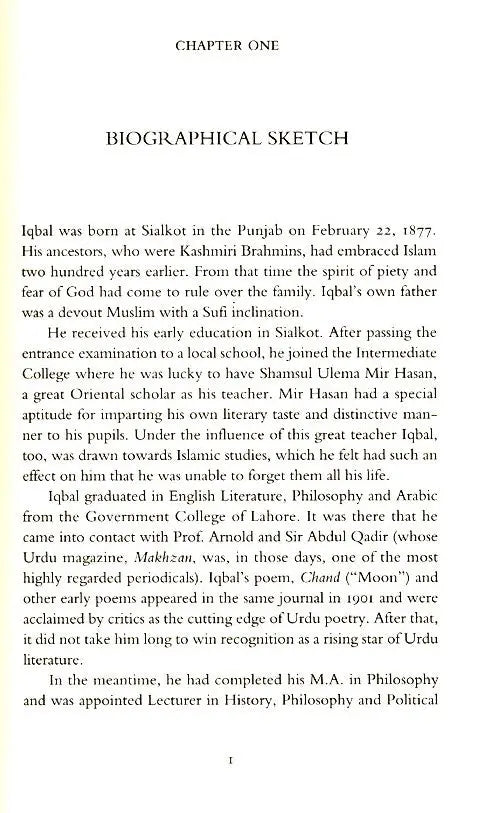About The Book
Iqbal's poems established him as a rising poet on the literary horizon of the subcontinent. His brilliance later dazzled the eyes of people living in distant countries and won for him an honourable place amongst the immortal poets of the world. It was after his return from Europe that he started his real poetic career. His transitory period was over.
His ideas had matured and he had formulated his outlook on human aspects, which lasted, throughout his life. "Asraari-Khudi" (Secrets of Self) and "Rumuzi-Bekhudi" (Mysteries of Selflessness) thrilled the literary circles of the East and the West.
These poems deliver the message he has for mankind and deal with the development of the individual self and the problems an individual faces as a member of society.
Table of contents
Introduction XI
Foreword XIX
1 Biographical Sketch 1
2 Formative Factors 9
3 Western Civilization 23
4 Modern Education 35
5 Knowledge and Learning 45
6 Art and Architecture 51
7 The Perfect Man 63
8 The Place of the True Believer 75
9 Satan’s Advisory Council 81
10 To the Arab Lands 95
11 The Mosque of Cordoba 103
12 Ardour and Eagerness 113
13 The Problem of Palestine 119
14 In Afghanistan 123
15 The Prayer of Tariq 129
16 To the Saqi 133
17 The Lamentation of Abu Jahl 141
18 Echo of Paganism 147
19 With Jamaluddin Afghani 151
20 At the Doorstep of the Prophet 159
21 Compliant and Prayer 171
22 Historical Truths and Allusions 179
Notes 193
About The Author
Abul Hasan Ali Hasani Nadwi (24 November 1914 - 31 December 1999) also spelt Abul Hasan Ali Hasani Nadvi (affectionately 'Ali Miyan') was an Indian, Islamic scholar, and author of over fifty books in various languages.
He received his early education at his home in Takia, Raebareli, Uttar Pradesh, India. His mother initiated his early training in Quranic studies; he later entered formal education in Arabic, Persian and Urdu. Abul Hassan Ali Nadwi primarily wrote in Arabic, although also in Urdu, and wrote more than fifty books on history, theology, and biography, and thousands of seminar papers, articles, and recorded speeches.
He wrote the book Maza Khasiral Alam be Inhitat al-Muslimeen, translated into English as Islam and the World.
The Islamist Syed Qutb commended Nadwi's writings for his use of the word jahiliyya to describe not a particular age in history (as earlier Muslim scholars did) but a state of moral corruption and materialism.
show more









